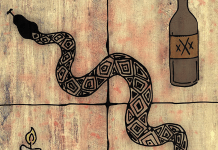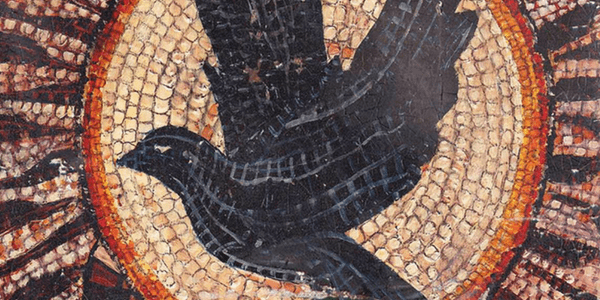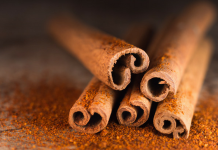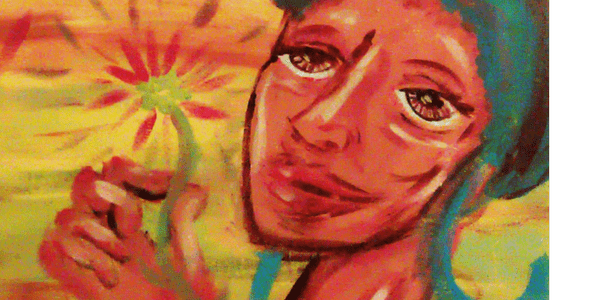 Finding guidance and materials when you are learning and trying to find your spiritual path can be difficult, especially when you’re a Black witch. Much of the readily information about magick and witchcraft has a very European feel to it which, in my experience, caused me to question if magick was even for me. ((See “Black witch blues: The whiteness of magick spaces.”))
Finding guidance and materials when you are learning and trying to find your spiritual path can be difficult, especially when you’re a Black witch. Much of the readily information about magick and witchcraft has a very European feel to it which, in my experience, caused me to question if magick was even for me. ((See “Black witch blues: The whiteness of magick spaces.”))
When I started on my journey as a Black witch, the Internet wasn’t what it is today. This gave me limited resources to work with, but for witches opening themselves to their own power today, the landscape is much, much different. Our access to books and guides is nearly boundless, if you know where and how to look. Simply googling “Black witch” will land you with a few good resources and a lot of pages about “black” magick.
To that end, this is a small guide for Black people to help them navigate the beginnings of practice. This includes resources such as books and blogs as well as general information on practices and classes.
Although this resource is focused on Black witches, I do encourage people who do not identify as Black, or a person of colour, to read this so that they have some idea of the differences in practices so that you do not insult someone’s practices unknowingly.
What is black witchcraft?
A Black witch is a Black person who engages in magical practices. This includes anyone who identifies as Black, and while I am using witch in this piece for the sake of ease; however, not all people who practice refer to themselves as witches and this is fine.
Black witches practice all traditions and paths. This includes African Traditional Religion (ATR), Kemetic (Egyptian-based) tradition, as well as Wicca, chaos magick, or some combination of any number of practices and belief systems.
There is no one right way to be a Black witch. Still, here are some terms that we will be using (and you may hear) as you begin your journey.
African Traditional Religion (ATR) – This a belief system based around beliefs that originated in Africa that are not Egyptian.
Orisha – These are the various gods and goddesses that are worshiped in ATR and ATR based practices such as Santeria.
Ancestors – These are exactly as it sounds, the spirits of our dearly departed that guide us.
Vodou – A spiritual practice that calls on Lwa with roots in ATR but a distinct practice on its own that was created in Haiti. The spelling is used to separate it from the Hollywood ideals of “Voodoo.”
Hoodoo – This is African-American folk magick. It is also referred to as “root work.”
As you read this piece, you may notice that I didn’t include anything about the Kemetic tradition or Egypt for the most part. This isn’t because I don’t think that isn’t a legitimate belief system. I left that information out as it is one of the only, if not the only, belief systems from Africa you can readily find information about. I have chosen instead to focus on the lesser known traditions in this piece.
This piece speaks a lot about ATR however, there are also resources for nonspecific paths.
Books to start you on your path
Books are where most people get started. They’re fairly easy to find, even you don’t have an occult or metaphysical shop close to you. Most chain book sellers carry Pagan or spiritual texts. What is missing from these booksellers, however, is much in the way of any African-based spiritual systems. In fact, for this information, you’ll have to venture online, which can be daunting.
If talking to other practitioners, they will likely recommend something by Silver Ravenwolf or Scott Cunningham. Although these texts are fine as an introduction (and are easy to access!) they tend to show very limited paths that one can walk.
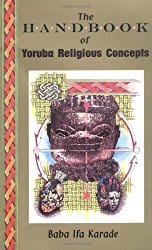 For those interested in learning more about Ifa or Yoruba based worship, The Handbook of Yoruba Religious Concepts, by Baba Ifa Karade is a good place to start. It acts as an introduction to the Yoruba belief system and can help give those curious an education in the Orishas and the basic beliefs of those that follow. This is only a beginning text, however. If you are drawn to this path, you will need to be initiated as reading will only take you so far.
For those interested in learning more about Ifa or Yoruba based worship, The Handbook of Yoruba Religious Concepts, by Baba Ifa Karade is a good place to start. It acts as an introduction to the Yoruba belief system and can help give those curious an education in the Orishas and the basic beliefs of those that follow. This is only a beginning text, however. If you are drawn to this path, you will need to be initiated as reading will only take you so far.
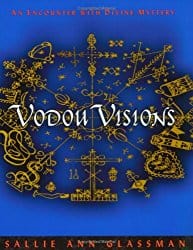 Another solid read to help understand more traditional practices is Vodou Visions: An Encounter with Divine Mystery, by Sallie Ann Glassman. This text focuses on invoking the Lwa. Vodou (Voodoo) is often demonized in the media as being “evil” but is one of the few types of magick that Black people are seen using. Learning more about this practice may help calm anxieties surrounding beginning your own practice, even if ultimately you do not decide to practice Vodou.
Another solid read to help understand more traditional practices is Vodou Visions: An Encounter with Divine Mystery, by Sallie Ann Glassman. This text focuses on invoking the Lwa. Vodou (Voodoo) is often demonized in the media as being “evil” but is one of the few types of magick that Black people are seen using. Learning more about this practice may help calm anxieties surrounding beginning your own practice, even if ultimately you do not decide to practice Vodou.
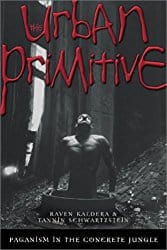 Another book I like to recommend is Urban Primitive: Paganism in the Concrete Jungle, by Raven Kaldera (yes, another Raven). This one is not specific to any belief system, but the practices it presents are rooted in the modern world and it shows how we can use magick in our everyday lives and really make it our own. Despite that fact that this writer is white, I really appreciated the way magick was presented as being open to will of the practitioner, which is to say, however you want to practice is fine! I’m recommending this book for witches who aren’t drawn to any clear paths but still are interested in working with magick.
Another book I like to recommend is Urban Primitive: Paganism in the Concrete Jungle, by Raven Kaldera (yes, another Raven). This one is not specific to any belief system, but the practices it presents are rooted in the modern world and it shows how we can use magick in our everyday lives and really make it our own. Despite that fact that this writer is white, I really appreciated the way magick was presented as being open to will of the practitioner, which is to say, however you want to practice is fine! I’m recommending this book for witches who aren’t drawn to any clear paths but still are interested in working with magick.
These are only three books and are meant to help begin your study, not be the totality of it.
Blogs and websites
Black Witch1 is an excellent resource for witches as it gives a bevy of information as well as perspective from the life of Black witch. This means that her posts deal not only with magick, both practical and philosophical, but also with the current issues that impact the lives of people of colour. I like this blog as it is focused on any tradition.
This is a strange one because it is also a shop, but the Original Products Botanica2 has an excellent blog that covers many topics related to ATR and Santeria. Although the blog posts include a number of links to products (that they are of course selling), the information is clearly written and it gives a good overview for beginners. As a bonus, the posts also show how different items such as candles, incense, beads, talismans, etc. can be used in practice.
Another strong resource for Black people looking to enter a magical practice is the African American Wiccan3 page. Despite its alliance with Wicca, it supports various paths and has information including a very comprehensive list of books. Many Black people find their way to magick through Wicca and even if they do not decide to continue to follow the Rede, this particular practice seems to be one that many people get their roots in. This site has adapted Wicca to be more suitable to Black people. For example, it updates the language and references the Orisha.
Speaking to the dead
There has been a good deal of demonization of magick that works with the dead thanks to media representations. When people think of magick and the dead, it often brings forth visions of Ouija boards and malevolent spirits. Add in images of Black people… and we get your basic Voodoo movie plot. However, this is not what working with spirits is at all.
In many African Traditional Religions, working with the ancestors is an important practice. It is about honouring the people who came before us and looking to them for guidance and protection. Even if you do not practice ATR directly, many Black witches still honour their ancestors along with other deities or energies. Building an altar is a large part of this.
Carolina Conjure4 has a great page on how to build an altar and what should be included in an altar, and the post I’ve linked to also explains some of the benefits to working with ancestors. One of the biggest, in my opinion, is that it gives new witches a safe place to start their practices. The familiarity of departed spirits will help them get used to working with spirits as well as help get past the barriers of starting a new practice. Working to invoke Hathor for favour may be a bit difficult at first, calling on your departed grandmother for guidance is a little easier.
The Brujeria5 website also has a very good and simple post on setting up an ancestral altar. This one might be more approachable to some as it is so simple but it lacks the more in depth explanations that Carolina gives.
Both of these sites are excellent resources for information on magick as practiced by people affected by the African diaspora. Although I’ve highlighted them for their information on ancestor altars, they have many posts on Vodou, hoodoo, rootwork, etc. The information is only an introduction however.
Classes, covens, and other face to face options
As I mentioned briefly before, some practices take initiation and classes. Some things cannot be learned without community. This can be hard, especially for people who are just starting out. If you have access to social media, there are many online magick groups focused on Black witches where you can ask questions and make connections with others.
This is one of the things that is vastly different in ATR and aligned practices verses the greater Pagan circle. If you choose this path, much of the knowledge beyond the most basic of understanding cannot be learned through books. You must be taught by someone else. To access deeper traditions, there are often financial obligations. When I first learned about this, it seemed fishy, after all, outside of supplies, no one else was charging for knowledge! But the more I learned the more I realized that it wasn’t a racket, it is more like paying tithes to support. Still, there are many people who would take advantage of people new to learning.
This is why it’s very important to have some community, even if it’s just online! Being able to ask if something is normal is very important. Trust your gut, if someone tells you something and it does not seem right, do not continue. If it doesn’t seem right to you, it is not right for you.
Black Witch Chronicles6 runs a social media page where she shares her knowledge as well as interesting articles and tidbits from around the web. She also has a year-long program7 to help Black witches find their path.
The Dawtas of the Moon Coven8 and convention runs a membership program as well as a yearly in person convention. If you are local to the area, this is a great way to meet other witches.
Parting advice for the Black witch
This post was focused on the lesser explored African-based practices and how to find out more about them, but that doesn’t mean that all Black witches aren’t free to explore paths that are different. This is preliminary information on learning about one type of magick that based in ATR practices, this does not have to be what you decide to work with; it may not speak to you.
Feel free to experiment and learn about whatever intrigues you and sparks your spirit. If it is not ATR that is fine. If it is ATR mixed with something else, that’s fine too! Just because you are Black does not mean that you have to follow an ATR or cannot mix it with other beliefs.
Your path is your own to walk, and you are the master of it.
Image credit: Detail from As Fleeting as Flowers, by Donyae Coles
- Black Witch, “Black Witch,” December 10, 2016. [↩]
- “Blog – Original Products Botanica,” January 11, 2017. [↩]
- “Welcome African American Wiccan Society, 2000. [↩]
- Carolina Conjure, “The Ancestors.” [↩]
- The Brujeria, “Ancestral Altar.” [↩]
- Facebook, Black Witch Chronicles. [↩]
- Black Witch University, “Sojourner’s Healing Room.” [↩]
- Check out Donyae Coles’ interview with founder Omitola Yejide Ogunsina. [↩]


